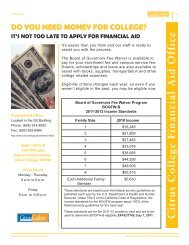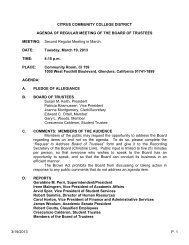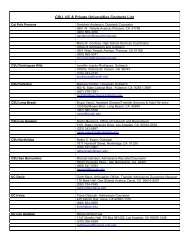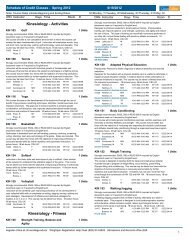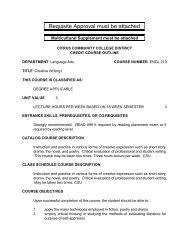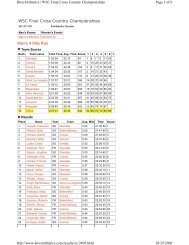Citrus College Catalog 2009-2010 (ver. 10/22
Citrus College Catalog 2009-2010 (ver. 10/22
Citrus College Catalog 2009-2010 (ver. 10/22
You also want an ePaper? Increase the reach of your titles
YUMPU automatically turns print PDFs into web optimized ePapers that Google loves.
An Important Note about<br />
Planning For Transfer<br />
In general, courses listed as<br />
preparation for a major may also<br />
be applicable as general education<br />
requirements. Students<br />
should refer to the catalog of the<br />
institution offering their intended<br />
major to determine lower-division<br />
major requirements, as well as<br />
those that are recommended or<br />
required in preparation for the<br />
major. Refer to the <strong>Citrus</strong> <strong>College</strong><br />
Transfer Planning Guide, available<br />
in the Transfer Center.<br />
In addition, the ASSIST website<br />
at www.assist.org, is the official<br />
California statewide database listing<br />
a selection of campus-approved<br />
articulation/transfer<br />
agreements, general education<br />
requirements, and information on<br />
UC and CSU transferable courses.<br />
Students are also advised to contact<br />
a <strong>Citrus</strong> <strong>College</strong> counselor for<br />
more information and for details<br />
regarding other transfer agreements<br />
and options not available<br />
on ASSIST.<br />
Teacher Education<br />
Students who plan to enter the<br />
teaching profession at the elementary<br />
or high school level can<br />
take their first two years of instruction<br />
at <strong>Citrus</strong> <strong>College</strong> and<br />
then transfer to a four-year uni<strong>ver</strong>sity.<br />
Teachers must demonstrate comprehensive<br />
knowledge of the subjects<br />
they teach, and subject<br />
matter preparation can begin at<br />
<strong>Citrus</strong>. For elementary school<br />
teaching, many general education<br />
courses will also apply to subject<br />
matter preparation.<br />
In order to avoid duplication of<br />
coursework and make the most<br />
efficient use of their time, students<br />
should see a counselor in<br />
the Center for Teacher Excellence,<br />
located in the ED Building.<br />
Preparation for Professional<br />
Schools<br />
Some professions, such as law,<br />
stress that candidates for admission<br />
to professional schools can<br />
best prepare themselves during<br />
college by acquiring se<strong>ver</strong>al fundamental<br />
skills. Others, for example,<br />
medicine and dentistry,<br />
emphasize certain subject matters.<br />
A student preparing for either<br />
emphasis (skills or specific<br />
subjects) has opportunities to do<br />
so by selecting, in consultation<br />
with an academic counselor, the<br />
kind of curriculum that most<br />
soundly meets the standards set<br />
by the profession he or she<br />
wishes to enter.<br />
Pre-Professional Programs:<br />
Medicine, Veterinary Medicine,<br />
Dentistry, Pharmacy<br />
The majority of students entering<br />
medical and dental schools in the<br />
United States do so after having<br />
acquired a B.A. or B.S. degree at<br />
an undergraduate college or uni<strong>ver</strong>sity.<br />
Possession of an undergraduate<br />
degree is especially<br />
worthwhile, since professional<br />
schools do not offer liberal arts<br />
subjects.<br />
Any undergraduate major is appropriate<br />
for a pre-professional<br />
student as long as certain basic<br />
subject areas are included in the<br />
program. For specific requirements<br />
of professional schools, the<br />
student is urged to consult special<br />
sources such as "Medical School<br />
Admission Requirements," a publication<br />
of the Association of<br />
American Medical <strong>College</strong>s or a<br />
counselor.<br />
In general, medical and dental<br />
schools recommend that the undergraduate<br />
degree program include:<br />
one year of general<br />
chemistry, one year of organic<br />
chemistry; one year of general biology<br />
with additional course work<br />
in developmental biology and/or<br />
comparative anatomy and genetics;<br />
and one year of physics.<br />
Other courses, such as mathematics<br />
through calculus and physical<br />
chemistry, are often<br />
recommended.<br />
Since pre-professional programs<br />
in dentistry place heavy emphasis<br />
on biology and chemistry, these<br />
are the two majors most often<br />
elected by pre-professional students.<br />
A pre-professional student<br />
majoring in biology should complete<br />
the biology lower division<br />
preparation, supported by courses<br />
in chemistry and physics. A preprofessional<br />
student majoring in<br />
chemistry should complete the<br />
chemistry lower division preparation,<br />
supported by courses in<br />
mathematics and physics.<br />
The science and mathematics<br />
components of pre-professional<br />
programs in veterinary medicine<br />
are quite similar to those for<br />
medicine. Admission to a school<br />
of pharmacy can also be gained<br />
after two years of undergraduate<br />
work. Although entrance requirements<br />
vary somewhat, they generally<br />
include full-year<br />
introductory courses in biology,<br />
chemistry, mathematics and<br />
physics. A course in organic<br />
chemistry is sometimes required.<br />
Pre-Engineering Program<br />
Most students earn engineering<br />
degrees by attending a uni<strong>ver</strong>sity<br />
with an accredited program in engineering.<br />
Although there are<br />
many different engineering disciplines,<br />
the first two years of<br />
course work is quite similar for<br />
most of these fields. The lower division<br />
major preparation completed<br />
at <strong>Citrus</strong> can prepare you<br />
for transfer to a pre-engineering<br />
program or an accredited engineering<br />
program.<br />
CITRUS COLLEGE CATALOG <strong>2009</strong> • <strong>20<strong>10</strong></strong> www.citruscollege.edu <strong>10</strong>5



